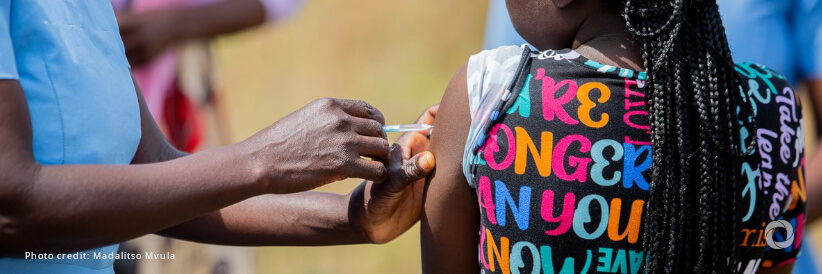The World Health Organization has called on the government, partners, and donors to join forces to ensure Malawi delivers a high-quality vaccination campaign against poliovirus. The World Health Representative for Malawi Dr Neema Rusibamayila Kimambo made the appeal at the launch of the polio vaccination campaign in Blantyre.
Malawi has kick-started the first round of a national supplementary immunization campaign against polio in 2023. The campaign targets to vaccinate about 8.8 million children from the age of fifteen years and below against the disease. This is following the declaration of a Wild Poliovirus Type 1 (WPV1) Outbreak in March 2022 after a case was detected in a young girl in Lilongwe. Since then, the country has identified three more cases of circulating vaccine-derived poliovirus 1 (cVDPV1) in children under 15 and circulating vaccine-derived poliovirus 2 (cVDPV2) in the environmental samples collected at one of the sites in Lilongwe.
“The confirmation of the Wild Poliovirus Type 1 and these circulating vaccine-delivered poliovirus in Malawi reminds us that we have unimmunized children within communities which is putting millions of children at risk of this preventable disease. Let us take advantage of this supplementary immunization campaign to boost immunity against polio in targeted children,” said Kimambo.
Based on Lot Quality Assurance Sampling, the previous vaccination campaign did not reach the desired coverage as they were less than the target of 90%.
“According to an assessment which was conducted by the Emergency Committee under the International Health Regulations (2005) (IHR) on the international spread of poliovirus in October, there is a high risk of ongoing polio transmission in Malawi and neighboring countries especially Mozambique. We must double our efforts to bolster our immunization systems to curb the spread of the virus and ensure that children live without the risk of infection and lifelong paralysis,” added Kimambo.
Mass vaccinations, or supplementary vaccinations, aim to interrupt the circulation of poliovirus by immunizing every child under 15 years with oral polio vaccine regardless of previous immunization status. The objective is to reach children who are either not immunized, or only partially protected, and to boost immunity in those who have been immunized.
The Minister of Health Honourable Khumbize Kandodo Chiponda, MP said: “The Ministry of Health with support from partners committed to implementing strategies for the eradication of polio in Malawi. Our goal is to sustain a good coverage of all vaccine antigens to prevent and contain vaccine-preventable diseases.”
During the launch, The Minister of Health led the Global Polio Eradication Initiative Partners, Ministry officials, and the public on a solidarity walk around Ndirande community where one of the polio cases was registered. The intention of the walk was to raise awareness of the immunization campaign and to mobilize communities to take action to end polio.
Polio is a viral disease with no cure. It invades the nervous system and can cause total paralysis within hours, particularly among children under 5 years. The virus is transmitted from person to person mainly through contamination of hands, water, or food by fecal matter. While there is no cure for polio, the disease can be prevented through the administration of a safe, simple, and effective vaccine

